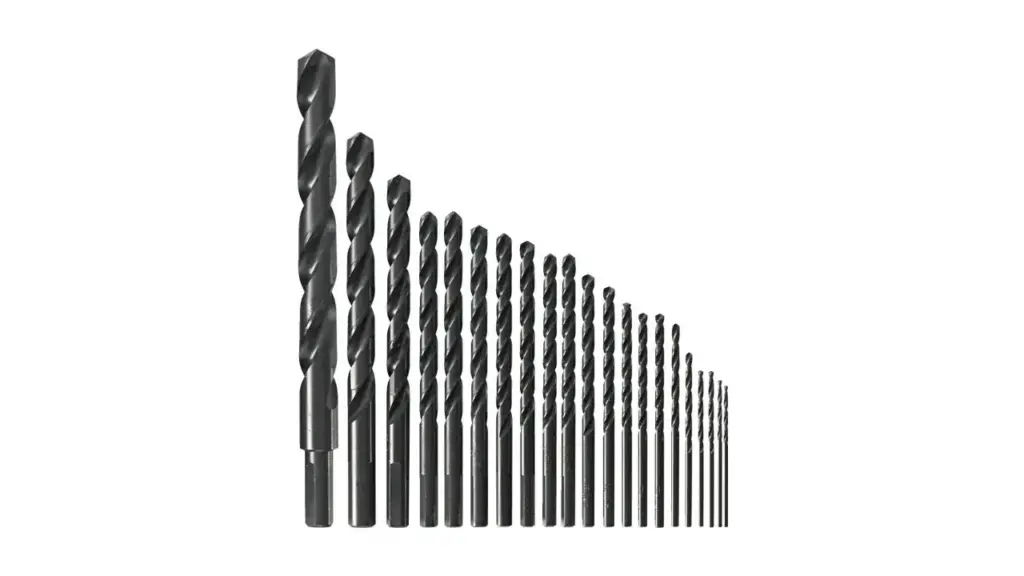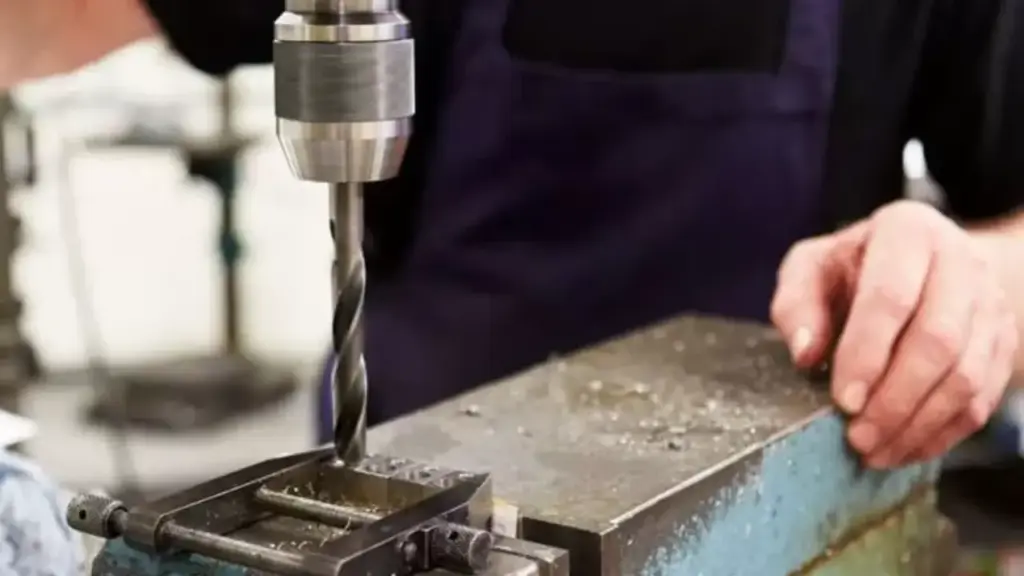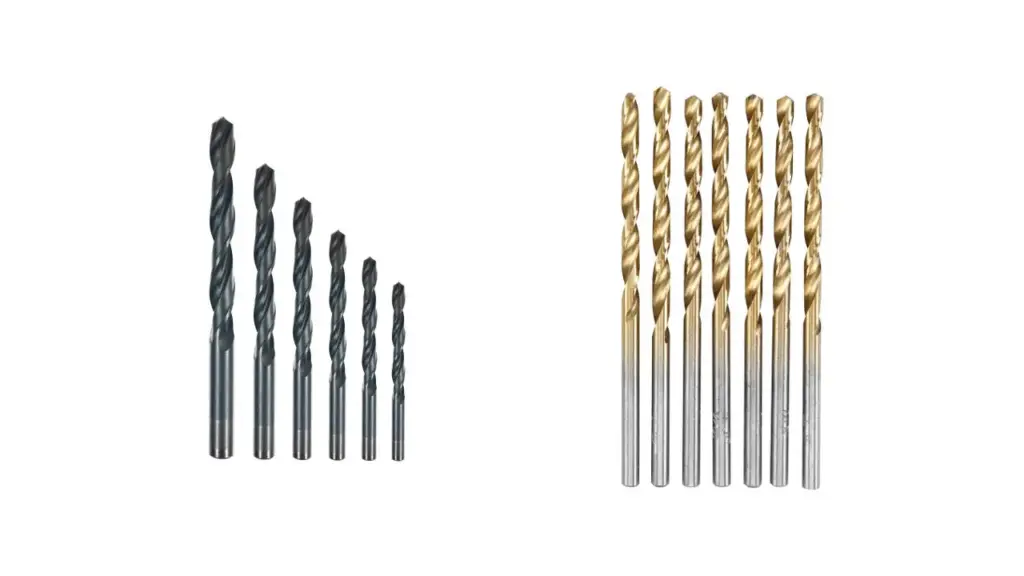Welcome to our comprehensive guide on black oxide drill bits! These widely used tools, recognizable by their dark finish, offer a cost-effective solution for various drilling needs. Understanding their properties and ideal applications is crucial for any DIY enthusiast or professional looking to achieve efficient and clean holes without breaking the bank.
In this blog post, we will delve into the characteristics of black oxide drill bits, exploring their benefits and limitations. We’ll clarify what materials they are best suited for, ensuring you select the right tool for your next project and maximize both performance and the lifespan of your drill bits.
What are Black Oxide Drill Bits

Black oxide drill bits are high-speed steel (HSS) drill bits that have been treated with a black oxide finish. This chemical process creates a thin layer on the surface of the bit, offering several benefits including increased corrosion resistance, improved lubricity for smoother drilling, and a slight reduction in friction and heat buildup compared to uncoated HSS bits.
These black oxide drill bits are a cost-effective and versatile option suitable for drilling into softer materials such as wood, plastic, and non-ferrous metals like aluminum and copper, making them a common choice for general-purpose use in home and workshop settings.
What Are Black Oxide Drill Bits Used For

Black oxide drill bits are a common and economical choice for a wide range of drilling tasks. Their distinctive black finish isn’t just for aesthetics; it provides practical benefits that enhance their performance in specific applications.
Understanding the properties and limitations of black oxide drill bits is crucial for selecting the right tool for your project, ensuring efficiency and preventing damage to both the workpiece and the bit. This exploration will delve into the primary uses of black oxide drill bits and the materials they are best suited for.
Drilling into Wood and Soft Materials
Black oxide drill bits are a go-to option for drilling into various types of wood, including softwood like pine and hardwood like oak. Their sharpness allows them to easily bore through the wood fibers, creating clean and relatively smooth holes for tasks such as furniture assembly, woodworking projects, and general construction. The black oxide coating provides a slight increase in lubricity, which helps the bit glide through the wood with less friction and heat buildup compared to uncoated high-speed steel bits. This can contribute to a longer bit life and more comfortable drilling, especially during extended use.
Furthermore, black oxide drill bits perform well when drilling into softer materials like plastic, acrylic, and composite materials. Their ability to create clean holes without excessive cracking or splintering makes them suitable for a range of DIY and light industrial applications involving these materials. The general-purpose nature of black oxide bits makes them a staple in most toolboxes, ready for a variety of tasks around the home or workshop that don’t involve particularly hard or abrasive materials.
Drilling into Non-Ferrous Metals
Black oxide drill bits are also commonly used for drilling into non-ferrous metals such as aluminum, copper, and brass. These metals are generally softer than steel, allowing the sharp edges of the black oxide bit to effectively cut and remove material. The slight lubricity provided by the black oxide coating helps to prevent the bit from seizing or binding in these softer metals, leading to smoother drilling and a better finish on the workpiece.
While black oxide bits can handle these non-ferrous metals adequately for many applications, it’s important to use appropriate drilling speeds and cutting fluids, especially when drilling thicker sections. This helps to manage heat buildup and further improve the quality of the drilled hole and the lifespan of the bit. For more demanding or high-volume work with non-ferrous metals, specialized bits designed for these materials might offer superior performance, but black oxide bits serve as a reliable and cost-effective option for general use.
Limitations with Hard Metals
Black oxide drill bits are generally not recommended for drilling into hard metals such as stainless steel, hardened steel, or cast iron. The relatively lower heat resistance and hardness of the high-speed steel, even with the black oxide coating, cause the bit to dull quickly when encountering these tough materials. The increased friction and heat generated can lead to premature wear, breakage of the bit, and poor quality holes with significant burring or work hardening of the material.
Attempting to drill hard metals with black oxide bits can also be inefficient and time-consuming, often requiring excessive force and resulting in frustration. For such applications, drill bits made from more robust materials like cobalt or those with specialized coatings like titanium nitride are far more suitable. These bits are designed to withstand the higher temperatures and abrasive nature of hard metals, providing better performance and a longer tool life.
General Purpose Use
Black oxide drill bits are widely favored for their versatility in tackling a broad range of common drilling tasks. From simple household repairs to more involved DIY projects, their ability to efficiently drill through wood, plastics, and soft metals makes them an indispensable part of any toolkit. Their affordability also makes them accessible to a wide range of users, from casual homeowners to seasoned hobbyists. The ease of use and availability in various sizes further contribute to their popularity for general-purpose applications.
Moreover, the black oxide coating offers a slight advantage in terms of tool maintenance. The mild corrosion resistance helps to protect the bit from rust and degradation, especially in environments with some humidity. While not as robust as specialized coatings, this added protection contributes to the overall lifespan of the bit when used within its intended material range. This combination of affordability, versatility, and basic protective features makes black oxide drill bits a practical choice for a multitude of everyday drilling needs.
Cost-Effective Solution
One of the primary reasons for the widespread use of black oxide drill bits is their cost-effectiveness. Compared to drill bits made from more expensive materials like cobalt or those with advanced coatings like titanium nitride, black oxide bits are significantly more budget-friendly. This makes them an attractive option for users who require a set of drill bits for occasional use or for a variety of general-purpose tasks without needing the specialized performance of more expensive alternatives.
The lower cost also allows users to build a comprehensive set of drill bit sizes without a substantial investment. This is particularly beneficial for DIY enthusiasts and homeowners who encounter a diverse range of drilling needs. While they may not offer the same longevity or cutting power on hard materials as premium drill bits, their affordability and adequate performance on softer materials make black oxide drill bits a practical and economical choice for a large segment of the market.
Are Black Oxide Drill Bits Better Than Titanium
Whether black oxide drill bits are better than titanium drill bits doesn’t have a straightforward “yes” or “no” answer, as the superiority of one over the other depends heavily on the specific application.
Black oxide drill bits are generally more affordable and offer good versatility for drilling into softer materials like wood, plastic, and non-ferrous metals.
Their black oxide coating provides improved lubricity and some corrosion resistance. Furthermore, black oxide bits can typically be resharpened more effectively, potentially extending their overall lifespan for appropriate applications.
Titanium drill bits, characterized by their titanium nitride (TiN) coating, offer increased surface hardness and reduced friction compared to black oxide bits. This allows them to maintain a sharper cutting edge for a longer period, especially when drilling into a wider range of materials, including harder woods and some metals like aluminum and mild steel.
The titanium coating also contributes to better heat resistance than black oxide, allowing for faster drilling speeds in suitable materials. However, once the titanium coating wears off, the bit’s performance diminishes, and resharpening can remove the coating, negating its benefits.
Here’s a breakdown to help you decide:
- Cost: Black oxide drill bits are generally more budget-friendly.
- Material Hardness: Titanium bits perform better on a wider range of materials, including some harder substances than black oxide.
- Heat Resistance: Titanium coatings offer better heat resistance than black oxide.
- Friction: Titanium nitride coating reduces friction more effectively than black oxide.
- Durability (for softer materials): Both can be durable, but titanium may hold an edge longer.
- Durability (for harder materials): Titanium bits are generally more durable.
- Resharpening: Black oxide bits are typically easier and more effective to resharpen.
In conclusion, if you primarily drill softer materials and prioritize affordability, black oxide drill bits are a solid choice. However, if you frequently encounter harder materials and need a bit that retains its sharpness and handles heat better, titanium drill bits are a worthwhile investment, despite their higher cost and potential limitations with resharpening.
Are Black Oxide Drill Bits Good for Metal
Black oxide drill bits can be used for drilling metal, particularly softer metals like aluminum, copper, brass, and mild steel. The black oxide coating provides a degree of lubricity, which helps to reduce friction and heat buildup during the drilling process in these materials. Additionally, the coating offers some corrosion resistance, which can extend the life of the drill bit.
For general-purpose drilling in softer metals and for occasional use on thicker sections, black oxide drill bits can be a cost-effective and adequate choice.
However, black oxide drill bits are generally not the best option for drilling harder metals such as stainless steel, hardened steel, or cast iron. These materials generate significant heat and require drill bits with higher heat resistance and hardness to maintain their cutting edge. Using black oxide drill bits on these harder metals will likely lead to rapid dulling of the bit, increased effort required, and potentially damage to both the workpiece and the drill bit. For drilling hard metals, drill bits made from materials like cobalt are recommended due to their superior heat resistance and durability.
Black Oxide vs Titanium Drill Bits

Choosing the right drill bit is essential for efficient and clean drilling. Black oxide and titanium drill bits are two popular options, each with distinct characteristics that make them suitable for different applications.
Black oxide bits are known for their affordability and general-purpose use, while titanium-coated bits offer enhanced hardness and reduced friction. Understanding their key differences will help you select the best bit for your specific drilling needs and materials.
Material and Coating
Black oxide drill bits are made from high-speed steel (HSS) that has been treated with a black oxide finish. This coating provides a mild level of corrosion resistance and slightly improved lubricity, helping to reduce friction during drilling. However, the black oxide layer is thin and does not significantly enhance the bit’s hardness or heat resistance beyond that of the underlying HSS.
Titanium drill bits are also typically made from HSS but are coated with titanium nitride (TiN). This coating is considerably harder than black oxide and significantly reduces friction between the bit and the workpiece. The titanium nitride layer helps the bit stay sharper for longer, especially when drilling into a wider range of materials compared to black oxide bits.
Performance and Application
Black oxide drill bits are well-suited for drilling into softer materials like wood, plastic, and non-ferrous metals such as aluminum and copper. They can also handle light-duty drilling in mild steel. However, they tend to dull more quickly when used on harder metals due to their limited heat resistance.
Titanium drill bits offer improved performance over black oxide bits in a broader range of materials, including hardwoods and some harder metals. The reduced friction and increased surface hardness allow for smoother and more efficient drilling, and they can generally withstand higher drilling speeds compared to black oxide bits when used appropriately.
Cost and Longevity
Black oxide drill bits are generally more economical upfront, making them a budget-friendly option for general use. However, their lifespan may be shorter, especially when used on harder materials.
Titanium drill bits typically have a higher initial cost than black oxide bits. However, their increased durability and ability to maintain sharpness for a longer period can make them a more cost-effective choice in the long run, particularly for users who frequently drill a variety of materials.
Black Oxide vs Cobalt Drill Bits
Choosing the right drill bit is crucial for efficient and effective drilling, and understanding the differences between black oxide and cobalt drill bits is key. Black oxide bits are a common, more affordable option for general use, while cobalt drill bits are engineered for superior performance and durability when drilling harder materials.
Knowing their distinct characteristics will help you select the optimal bit for your specific drilling needs and ensure the longevity of your tools.
Material and Construction
Black oxide drill bits are manufactured from high-speed steel (HSS) that has undergone a surface treatment to create a thin, black oxide layer. This coating provides mild corrosion resistance and slightly improves lubricity, reducing friction during drilling. However, the black oxide layer does not significantly enhance the inherent hardness or heat resistance of the underlying HSS.
Cobalt drill bits are made from HSS that has been alloyed with cobalt, typically ranging from 5% to 8%. This integral addition of cobalt throughout the bit significantly increases its hardness, strength, and, most importantly, its ability to withstand high temperatures generated during drilling. This makes them inherently more durable and capable when working with tough materials.
Performance and Application
Black oxide drill bits are best suited for drilling into softer materials such as wood, plastic, and non-ferrous metals like aluminum and copper. They can also handle light-duty drilling in mild steel. However, they tend to dull relatively quickly when used on harder metals due to their limited heat resistance and hardness.
Cobalt drill bits excel in drilling hard and abrasive materials, including stainless steel, cast iron, titanium, and hardened alloys. Their superior heat resistance allows them to maintain a sharp cutting edge even under demanding conditions, resulting in cleaner holes and a longer lifespan in such applications compared to black oxide bits.
Cost and Longevity
Black oxide drill bits are generally more economical upfront, making them an attractive option for budget-conscious users and those with occasional drilling needs in softer materials. However, their lifespan may be shorter, especially when used on harder materials.
Cobalt drill bits have a higher initial cost due to the expensive cobalt alloy used in their construction. However, their exceptional durability and ability to effectively drill hard materials often translate to a longer overall lifespan, making them a more cost-effective choice in the long run for professionals and those who frequently encounter challenging drilling tasks.
Conclusion
In summary, black oxide drill bits are a cost-effective and versatile option for drilling softer materials like wood, plastic, and aluminum. Their black oxide coating provides a degree of corrosion resistance and improved lubricity, making them suitable for general DIY tasks and light-duty drilling.
While not ideal for very hard metals, black oxide bits offer a good balance of performance and affordability for common household and workshop projects. They are a staple for basic drilling needs and represent an accessible entry point into power tool accessories.
When sourcing wholesale drill bits from us, remember that black oxide bits cater to a broad market with everyday drilling requirements. Stocking a variety of sizes will meet the needs of many customers looking for reliable and budget-friendly drilling solutions.


